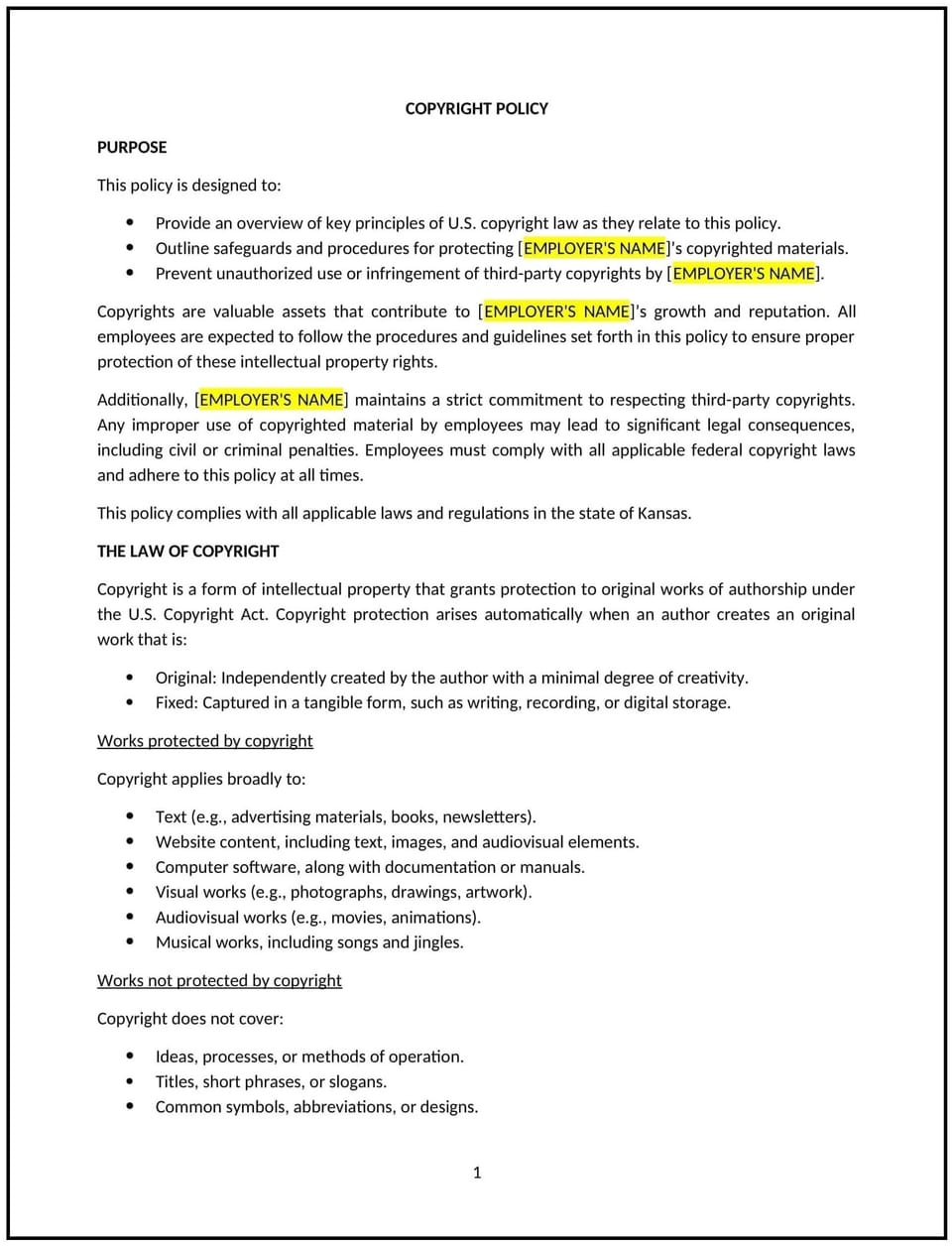Copyright policy (Kansas): Free template

Copyright policy (Kansas)
A copyright policy helps Kansas businesses protect intellectual property, define ownership rights, and ensure that employees use copyrighted materials legally. This policy outlines how businesses should handle original content, licensing, and permissions while preventing unauthorized use of copyrighted materials.
By implementing this policy, businesses can safeguard their creative assets, respect intellectual property laws, and reduce the risk of copyright disputes.
How to use this copyright policy (Kansas)
- Define copyright ownership: Businesses should establish whether intellectual property created by employees, contractors, or partners belongs to the business or the creator.
- Set guidelines for using third-party content: Businesses should require employees to obtain permission or licenses before using copyrighted images, text, music, or software.
- Outline fair use considerations: Businesses should educate employees on when limited use of copyrighted material may be allowed under fair use principles.
- Require proper attribution: Businesses should specify how to credit creators when using licensed or public domain content.
- Establish procedures for copyright infringement claims: Businesses should define how to handle notices of copyright violations and remove unauthorized content when necessary.
- Protect original business content: Businesses should outline measures for registering and enforcing copyrights on their original materials, such as logos, marketing content, and proprietary software.
- Review and update regularly: Businesses should periodically assess copyright policies to address evolving industry practices and legal considerations.
Benefits of using a copyright policy (Kansas)
- Protects business intellectual property: Safeguards original content from unauthorized use or reproduction.
- Reduces legal risks: Helps prevent copyright violations and potential infringement claims.
- Clarifies ownership rights: Establishes clear guidelines on content ownership for employees, contractors, and partners.
- Supports brand integrity: Ensures that marketing, branding, and product materials remain legally protected.
- Promotes ethical content use: Encourages responsible use of copyrighted materials in business operations.
- Enhances content management: Provides structure for licensing, attribution, and copyright enforcement efforts.
Tips for using this copyright policy (Kansas)
- Communicate copyright rules clearly: Businesses should ensure employees understand copyright protection and usage guidelines.
- Use licensed or original content: Businesses should encourage the use of properly licensed materials or content created in-house.
- Implement copyright tracking tools: Businesses should monitor content use to detect unauthorized reproductions.
- Establish a response plan for infringement claims: Businesses should be prepared to address copyright disputes and remove content when necessary.
- Educate employees on fair use: Businesses should provide training on when and how copyrighted materials may be used under fair use provisions.
- Register original works when necessary: Businesses should protect high-value intellectual property through copyright registration.
Q: Why should Kansas businesses implement a copyright policy?
A: Businesses should implement a copyright policy to protect original content, prevent unauthorized use of copyrighted materials, and reduce legal risks related to intellectual property.
Q: What types of materials should businesses protect under copyright?
A: Businesses should protect original works such as branding materials, marketing content, software, written documents, graphics, and proprietary research.
Q: How should businesses handle the use of third-party copyrighted materials?
A: Businesses should require proper licensing, attribution, or written permission before using copyrighted text, images, music, or software.
Q: What should businesses do if they receive a copyright infringement notice?
A: Businesses should review the claim, assess the validity of the alleged violation, and take appropriate action, such as removing unauthorized content or seeking legal guidance.
Q: Can employees claim ownership of work created for the business?
A: Businesses should establish clear agreements regarding intellectual property ownership, ensuring that content created as part of employment or contract work is assigned to the business when applicable.
Q: How often should businesses review and update their copyright policy?
A: Businesses should review their policy annually or whenever copyright laws or industry practices change to ensure continued protection of intellectual property.
This article contains general legal information and does not contain legal advice. Cobrief is not a law firm or a substitute for an attorney or law firm. The law is complex and changes often. For legal advice, please ask a lawyer.


